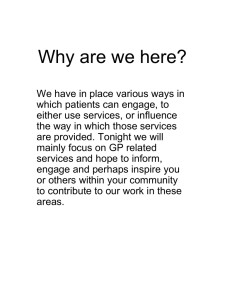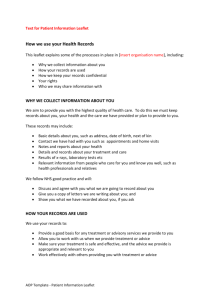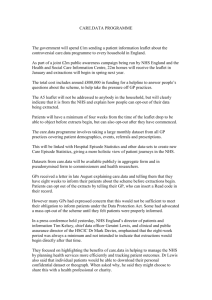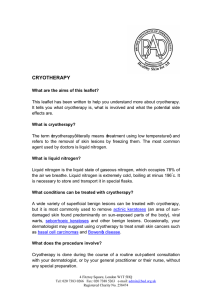Care of your skin after Cryotherapy
advertisement
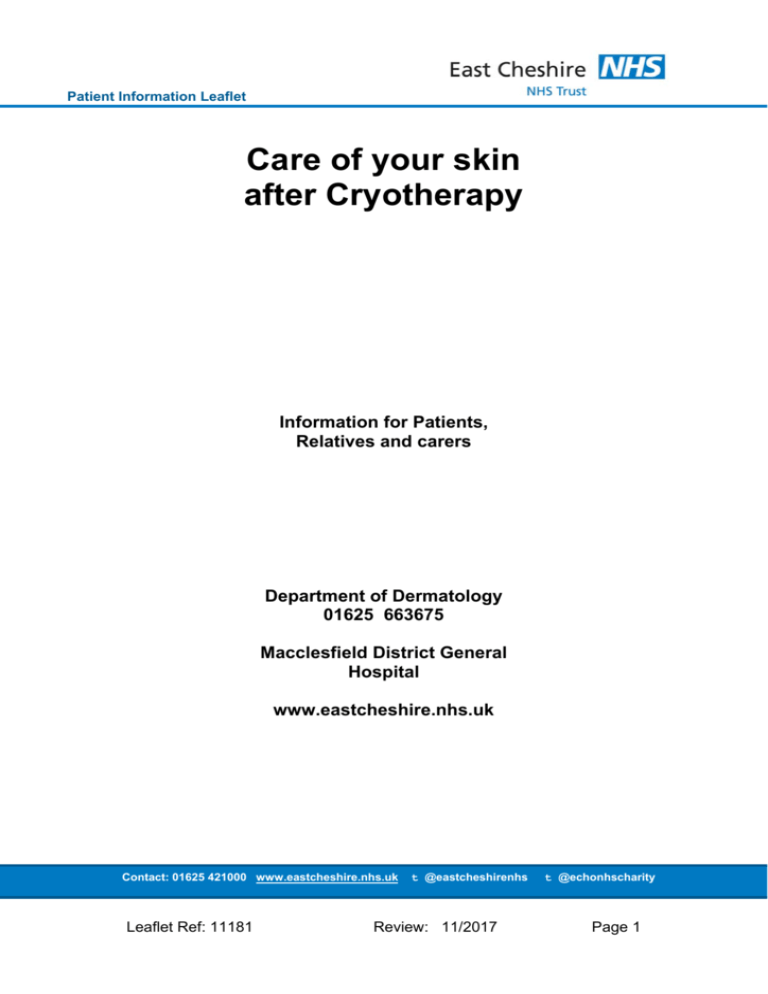
Patient Information Leaflet Care of your skin after Cryotherapy Information for Patients, Relatives and carers Department of Dermatology 01625 663675 Macclesfield District General Hospital www.eastcheshire.nhs.uk Contact: 01625 421000 www.eastcheshire.nhs.uk Leaflet Ref: 11181 t @eastcheshirenhs Review: 11/2017 t @echonhscharity Page 1 Patient Information Leaflet Care of your skin after cryotherapy Cryotherapy is a safe, effective and efficient treatment which is used to treat lots of skin different skin conditions, such as actinic keratoses (small areas of sun damaged skin), seborrhoeic keratoses and viral warts. It may also be used to treat small skin cancers, such as basal cell carcinomas and Bowens disease. It is a technique which uses liquid nitrogen to rapidly freeze the cells on your skin which need treating. As the skin thaws, the cells which have been frozen are damaged and new healthy cells grow to replace them. General Care of the treated area. The area can be washed with luke warm water using a soap or a soap substitute (avoid anything perfumed as this may irritate the area). Leave dry unless it is weeping then it may be covered with a simple dressing. When it stops weeping a scab will form which may remain in place for up to 2 weeks, sometimes longer. After this the area should heal normally. Please do not be tempted to pick the scab. Areas that have treated on the legs may take longer to heal. As with any treatment there are always possible side effects and potential complications. Immediate side effects Pain – a burning pain is usually felt on freezing which may become more Intense and throb on thawing. This can last for a short while afterwards. Painkillers, such as paracetamol, may be taken for up to 24 hours to help with any discomfort. Swelling and redness – this is a normal response and usually settles after 2 -3 days. Cool compresses may help. Blistering – this is quite common but usually settles after a couple of days and then a scab will form. Blisters are best left alone. However, if it begins to feel very uncomfortable, becomes tense (hard) or the blister becomes blood filled,then it may be punctured with a sterile needle to allow the fluid to drain out and then covered with a dressing. Contact: 01625 421000 www.eastcheshire.nhs.uk Leaflet Ref: 11181 t @eastcheshirenhs Review: 11/2017 t @echonhscharity Page 2 Patient Information Leaflet Infection – this is unusual A smear of antiseptic cream, such as Savlon or Germaline may be applied twice a day to reduce the very small risk of infection. Later possible side effects Pigment change – sometimes the treated area may become darker or lighter in colour than it was before, especially in people with darker skin. This may be permanent. Scarring – this rarely happens but may if a deep freeze has been necessary, such as when treating a basal cell carcinoma. Numbness – this is a rare occurrence and only happens if a superficial nerve is frozen in the area. This only lasts a short time and normal feeling will return within a couple of months. Return of the problem – sometimes the treatment may not be effective or the problem could return. Useful contact numbers and for further information: British Association of Dermatologists www.bad.org.uk New Zealand Dermatological Society www.dermnetnz.org Any Questions? If you are worried about something or don’t understand anything you have been told, the specialist nurse is there to help. She is available from 9am – 5pm Monday to Friday & can be contacted on 01625 663016 Contact: 01625 421000 www.eastcheshire.nhs.uk Leaflet Ref: 11181 t @eastcheshirenhs Review: 11/2017 t @echonhscharity Page 3 Patient Information Leaflet For further information on the references and sources used for this leaflet, please contact 01625 661184 Comments, compliments or complaints We welcome any suggestions you have about the quality of our care and our services. Contact us: Freephone: 0800 1613997 Phone: 01625 661449 Textphone: 01625 663723 Customer Care, Reception, Macclesfield District General Hospital, Victoria Road, SK10 3BL For large print, audio, Braille version or translation, contact Communications and Engagement on 0800 195 4194. East Cheshire NHS Trust operates a smoke-free policy (including e-cigarettes) For advice on stopping smoking please contact our Stop Smoking Service on 0800 085 8818. . East Cheshire NHS Trust does not tolerate any form of discrimination, harassment, bullying or abuse and is committed to ensuring that patients, staff and the public are treated fairly, with dignity and respect. Contact: 01625 421000 www.eastcheshire.nhs.uk Leaflet Ref: 11181 t @eastcheshirenhs Review: 11/2017 t @echonhscharity Page 4
